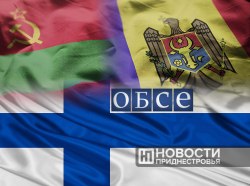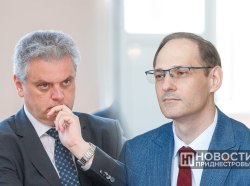Tiraspol, February 10. /Novosti Pridnestrovya/. A week has passed since the Moldovan Parliament adopted the so-called law on separatism in the final reading. Recall that these are amendments to the Criminal Code of the Republic of Moldova, which introduce punishment for: “separatism”, “conspiracy against Moldova”, “creation of an illegal information structure”. The last two concepts have not been fully disclosed, as, indeed, many other things in this law. But one thing is clear: the amendments are directed against Pridnestrovie and its inhabitants, and the Moldovan authorities do not hide this.
"Doomed to Be Selective"
At the same time, it is characteristic that even the representatives and sympathizers of the ruling PAS party themselves are not particularly euphoric about the adoption of the law (well, with the exception of Oazu Nantoi, who was already going to drop the 5 + 2 negotiation format “in a dumpster”). PAS MP and Vice Speaker of the Moldovan Parliament Mihai Popsoi, in an interview with the Russian Kommersant, admitted that the amendments to the Criminal Code of the Republic of Moldova could complicate the negotiations between Tiraspol and Chisinau.
Critics of the “law on separatism” consider that one of its main flaws is that it will be opportunistic, and selective: it can be used against one person, while it cannot be used against the other. For example, in Moldova, there are pro-Romanian unionists, who, in accordance with the adopted amendments, can go directly to jail under the article “conspiracy against Moldova”. But no - PAS has already stated that unionists would not be subject to this law.
Some supporters of the current Moldovan Government fully agree that such opportunism looks bad. Former adviser to the President of the Republic of Moldova Peter Luchinsky and political analyst Anatoly Tseranu, who in 1998 proposed to involve NATO forces in the Moldovan-Pridnestrovian settlement, notes that “in a legal state, the law should not function selectively, while this law is doomed to be selective.”
“I don't think the authors thought very well when they concluded that it was necessary to formulate this law and vote for it. For any prosecutor, this is a major headache: how to initiate [cases], against whom to initiate it, how to initiate it. For lawyers, this is a real Eldorado - there are so many opportunities to protect your potential client,” Tseranu said in the New Week program on the Moldovan TV8 channel.
He added that “if these amendments are followed very punctually, then Mr. Serebryan [the political representative of the Republic of Moldova], who will go to negotiate something in Pridnestrovie tomorrow, can easily fall under the law,” while the Deputy Prime Minister of the Republic of Moldova, Andrey Spinu, who participated in the negotiations according to the energy contract with the PMR, actually "should get a life sentence."
"They Came and Brought a Load of Nonsense"
The Moldovan parliamentary opposition, primarily represented by the Bloc of Communists and Socialists, reacted sluggishly to the adopted amendments. On the other hand, representatives of non-parliamentary parties, civil activists, and experts do not mince words.
“These people [PAS representatives] came to Parliament and brought a load of nonsense. This law is not needed. It complicates the situation for everyone,” Mark Tkachuk, one of the leaders of the Moldovan Civic Congress party noted. A little earlier, he wrote an author`s column in which he called himself a "separatist."
Tkachuk agrees that the new amendments will "create an atmosphere of distrust" and "bury all those minor achievements" that Tiraspol and Chisinau managed to achieve during the years of negotiations.
“The adopted "law on separatism" transfers communication with Pridnestrovie from the political and diplomatic sphere to the prosecutorial and criminal one. Today, 288 thousand holders of passports of the Republic of Moldova in Pridnestrovie are real separatists who, according to the authorities, only deserve criminal prosecution. The hunting season for "Pridnestrovian witches" in Moldova is open," the representative of the State Corporation told the Russian Kommersant.
In the New Week program, Tkachuk mentioned that Pridnestrovie sells electricity to Moldova "for about 380 thousand dollars a day", and now this money is "financing separatism and an anti-constitutional entity."
The analytical portal Regional Trends Analytics (RTA) also noted that with the adoption of amendments to the Criminal Code of the Republic of Moldova, “the negotiation process between Moldova and Pridnestrovie in the classic sense of the last twenty years has de facto been destroyed.” The RTA does not rule out that the Western curators of Moldova may be behind this.
The Head of the Moldovan Public Council "For a Free Motherland" Igor Tulyantsev called the law on separatism "a strange method [of the authorities of the Republic of Moldova] to win over [Pridnestrovie]". “It is impossible to come and talk about something peacefully, holding a pistol in one hand and a chainsaw in the other,” he said in an interview with Sputnik-Moldova News Agency.
According to political analyst, Director of the Balkan Center Sergey Manastyrly, the “law on separatism” appeared, among other things, against the background of domestic political failures of the ruling PAS party. “The economic crisis and inflation are ongoing. The standard of living in the Republic of Moldova is declining, Maya Sandu's regime has gained no victory in the fight against corruption. Accordingly, the PAS authorities and the Government are forced to look for an external enemy. And even to invent it to divert the attention of the population from their catastrophic failures in work,” Manastyrly believes. He believes that in the current situation, there are only two ways out: if the "law on separatism" is applied, it will turn into a conflict with Pridnestrovie; if not, then the amendments will simply remain a dead weight in the Criminal Code of the Republic of Moldova.








